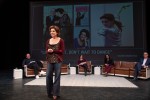The “10 Questions” lecture series, which will address a different question each week, doubles as a course for students and a panel open to the public. The series will explore open-ended questions such as “What is beauty?”, “What is failure?” and “What is knowledge?”
Each week’s panel will feature two faculty members from the School of the Arts and Architecture and two faculty members from other departments who will approach the question of the week from the perspective of their academic disciplines.
UCLA faculty from the arts, political science and athletics answered the question “What is failure?” from the perspectives of their respective fields at the panel Tuesday.
Janet O’Shea, a dance professor, integrated her martial arts background into her discussion on failure with a physical exercise. She stopped in the middle of her lecture and asked the audience to throw a slow punch at the person next them. The person who received the punch was supposed to deflect it away.
O’Shea said the demonstration was designed to highlight the instances of failure in martial arts practice, such as not landing a punch, and how this failure may be hard to accept but cannot be dwelled upon when sparring.
O’Shea said she believes the best way for students to cope with failure is physical practice.
“One way that you can really navigate failure is through learning a physical skill,” O’Shea said.
After the panel, O’Shea said society presents two contradictory views on failure.
“(There is the idea that) failure is bad and it should be avoided at all cost and everyone has to be a winner and at the same time we have this (idea that) failure is good and if only we failed more we would be more successful,” O’Shea said.
Valorie Kondos Field, the UCLA women’s gymnastics coach, said that, for her, the word failure does not exist. Kondos Field discussed the struggle of getting this idea across to her athletes while coaching a sport that depends on perfection.
Kondos Field said the fear of failure is present in many people but every failure can always be replaced with a success.
“Anytime you have learned something, how can that be a failure?” Kondos Field said.
Kondos Field said people can teach the next generation to be less fearful of failure.
“I really feel that our country needs to model a cultural shift of how to raise children to free them and release them (from failure),” Kondos Field said.
She added she hopes parents can teach young children to enjoy play and not focus so much on competition.
David Gere, an art professor, presented a more personal and emotional account of failure. Gere said he feels devastating failure when he thinks about his work with HIV and AIDS activism.
Gere explained the large numbers of infections and deaths that have resulted from HIV and AIDS.
He said he thinks protest, education and change in cultural practices are important to help start a conversation and provide a solution to this systemwide failure that has occurred with the AIDS crisis. Gere said this model can apply to dealing failure within many disciplines and help start a discussion on the topic.
The presenters and audience members participated in an open forum discussion after the individual lectures.
Many of the panelists said that this demonstration of civil discourse was necessary to change society’s views on failure.
Leslie Villatoro, a third-year sociology student who is enrolled in the course, said she enjoys the class because of the discussion and its contrast to a traditional lecture. Villatoro said this discussion helped change her initially negative views on failure.
“Failure doesn’t have to be this totally horrible thing,” Villatoro said. “It’s something that needs to happen and you can overcome it.”
Todd Hanson, a UCLA alumnus who attended the event, said he appreciated how Kondos Field has developed a program that allows athletes to let go of the fear of failure while participating in a sport that demands perfection.
“If they can do it there we can all experience that freedom anywhere,” Hanson said.
After the event, Gere said the fear of failure that occupies the gymnasts on Kondos Field’s team is not so different from the fear of failure that UCLA students have.
“There has to come a moment for each of us when we do what we want because it’s the right thing for us and we don’t care what other people are going to say,” Gere said.
Gere acknowledged the many diverse definitions of failure among different disciplines. He appreciated each individual take on failure and how different failure can be for so many people.
“We could have interviewed 200 people in the audience and we would have gotten 200 stories about what failure means,” Gere said. “It sounds like a bigger conversation that needs to happen.”
